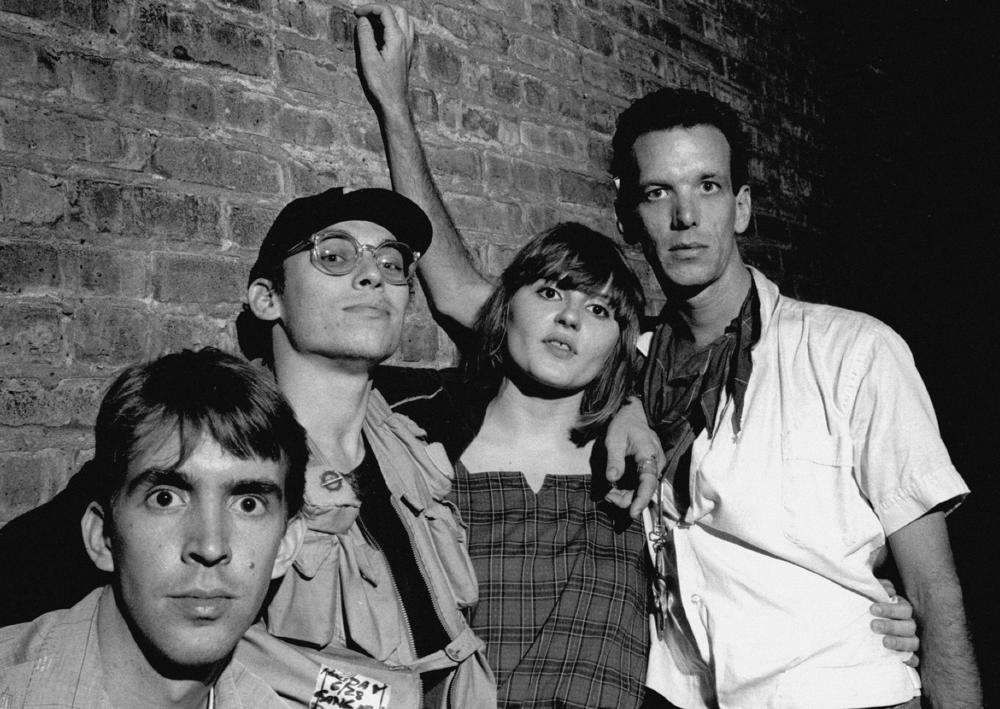
Section Branding
Header Content
New Box Set Celebrates Pylon's Influential Music
Primary Content
They were art students at the University of Georgia. And they had this idea that not being musicians could be a good foundation for a band — that not knowing what they were supposed to do might lead to new ideas. Hear the conversation on a new box set that celebrate's Pylon.

The B-52s and R.E.M. were instrumental in putting Athens, Georgia, on the musical map a few decades ago.
But it was another band who just may have been everyone's favorite in that southern city. They called themselves Pylon.
Rolling Stone magazine dubbed Pylon’s “Cool” one of the top 100 debut singles of all time, and it's one of the 47 tracks on a new box set that collects the band's two studio albums, “Gyrate” and “Chomp,” which have been remastered, plus a bunch of unreleased recordings.
“I'm just excited that there's a conversation about our music,” says Michael Lachowski, who played bass in Pylon. “And so hopefully it'll be accessible to a lot of people and maybe inspire some people and their own creativity.”
Creativity is certainly what happened when Lachowski, Randall Bewley, Curtis Crowe and Vanessa Briscoe Hay put the band together in the late 1970s.
The foursome weren’t musicians. They were art students at the University of Georgia. And they had this idea that not being musicians could be a good foundation for a band — that not knowing what they were supposed to do might lead to new ideas.
So Lachowski bought a $35 bass guitar from a pawnshop, and Bewley bought a cheap guitar there, too. They started learning how to make their instruments sound good even if they didn't technically know how to play them.
Crowe joined them on drums, and they asked their friend Hay to sing.
“And it just kind of gelled into its own language and had its own inherent energy that really was just hard to predict exactly how it was going to all come together,” Lachowski says. “I think our conviction is what carried us through.”

Pylon took its name from the safety cones that cordoned off areas at the DuPont textile plant where they worked part time, always sure to wear their safety glasses and steel toe boots.
In an early press release, Pylon described their music as feasible rock and said they were concerned with caution but also adventure, a nod to the song “Precaution” on their first record.
Hay says she approached the lyrics and the songs Pylon wrote like she would approach what she was familiar with — an art project.
“One of our professors had told us a drawing can be finished with the first gesture,” she says, “and so that first gesture is important and also how you end it it is important, so I just tried to find myself, like within the framework of the song, I would try to make something that fit.”
Pylon's sweaty, kinetic live performances cemented their reputation. R.E.M. drummer Bill Berry called Pylon the best live band he ever saw.
R.E.M. even covered one of Pylon's songs called “Crazy.” Guitarist Peter Buck wrote that he heard Pylon's version of “Crazy” on the radio the same day his band's “Chronic Town” EP was released, and he was suddenly depressed by how much better Pylon's record was than his band's.
But as good as the band's fans thought Pylon was, Lachowski says they were never in it for the long run. Music wasn't going to be a career for them.
“It kept us going for a while,” he says. “I think we eventually sort of ran up against the expectations of the music business as kind of a business. We didn't hang in there real long, but we had a wonderful run that went years beyond our initial expectations I would imagine.”
Pylon was popular enough to land a spot opening for U2, but they only played a few shows on that 1983 tour. The band played their last show at the Mad Hatter in Athens on the first of December that year.
Since then, there have been a few reunions and a new record called “Chain.” But Hay says ending the band in ‘83 was the right call.
“At the time we made that decision together and for better or for worse, it was our decision and we made it,” she says. “It wasn't something that someone made for us.”
Hay started a family and also became a nurse. These days she still sings for a band called the Pylon Reenactment Society.
But she says there's one bittersweet aspect to the new attention Pylon is receiving right now because of this new box set. Bewley, who had a heart attack and died in 2009 at age 53, will be remembered.
“He was such an incredible and gifted guitarist,” she says. “He was a sculpture major, and he didn't know how to make chords or any of the stuff. He made some incredible sounds, so to me it's very important that Randy especially be remembered.”
Music journalist Stephen Deusner compares Pylon to The Monkees or The Archies because they were a gang and did everything together.
Lachowski says that was really true, especially when Pylon was on the road, spending long hours in their van between shows.
“I think that all contributed, that when we got on stage to perform, we were all coming from the same place,” he says. “We weren't trying to figure out what each other had been doing all day or something. We were all there, all together, and it was a ramp toward the performance. And that's where all of our energy went, was just to that part of the day — the performance.”
Lachowski and Hay still live where Pylon started. Lachowski works at the Georgia Museum of Art at the University of Georgia in Athens, which is also home to a collection of Pylon artifacts and images.
Many of them are featured in a book that comes with the new box set. Flipping the pages is like looking through a family's photo album.
It tells the story of a band called Pylon.
This story comes to GPB from WBUR's "Here & Now."
